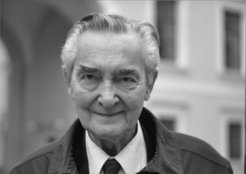A Life for Science - Former Scientific Member Heinz Georg Wagner passed away
We mourn Prof. Dr. rer. nat. Dres. h.c. Heinz Georg Wagner, Director Emeritus at the Max Planck Institute for Dynamics and Self-Organization, (until 2004 Max Planck Institute for Flow Research). He died in Göttingen on 29 July 2020 at the age of 91.

Heinz Georg Wagner was born on 20 September 1928 in Hof (Saale). He studied chemistry and physics at the Technische Hochschule Darmstadt, where he received his doctorate in 1956 and his habilitation at the Georg-August-Universität Göttingen in 1960. As Professor of Physical Chemistry at the Ruhr University of Bochum, he played a key role in the planning and establishment of the Chemistry Department. In 1970, he became Professor of Physical Chemistry at the Georg-August-University of Göttingen and Scientific Member of the Max Planck Society at the Max Planck Institute for Flow Research.
Elementary Reactions
The scientific work of Heinz Georg Wagner focused on basic research with great potential for applications with special relevance to the environment. The topic of nitrogen oxides and sulphur oxides, which occur as pollutants in combustion processes, for example in automobile engines, is still very much relevant today. He investigated the elementary reactions that lead to the formation of such pollutants and developed proposals for solutions to reduce them. For example, he showed that the introduction of water vapour in combustion processes can influence the emission of pollutants such as soot. In addition, Heinz Georg Wagner investigated elementary reactions of atoms and radicals in different states, unimolecular reactions, hydrocarbon oxidation and atmospheric reactions, the course of chemical reactions under laser radiation and condensation processes. His experiments on explosion and combustion processes focused on the investigation of flame structure and stability, ignition processes, flame inhibition, flame acceleration, high pressure combustion, supersonic combustion and structure, development and stability of detonations as well as explosion protection and safety engineering and soot formation. Heinz Georg Wagner also addressed the fundamental importance of safety in chemical and technical plants. He also made siginicant contributions the understanding of mixed-phase thermodynamics, vapour-liquid equilibria and the dynamics of separation processes.
Grand Federal Cross of Merit
In addition to his scientific work, Heinz Georg Wagner was active in developing and shaping German science policy. For example, he worked for many years at the Deutsche Forschungsgemeinschaft, first as a Fachgutachter, then as deputy chairman of the Chemistry Committee and finally as vice president responsible for chemistry, physics and the DFG's international relations. He was also a member of the Academia Europaea, the German National Academy of Sciences Leopoldina and of the Academy of Sciences in Göttingen, where for many years he served as the Secretary .
Hans Georg Wagner was awarded numerous honours and prizes. For his contributions to safety in chemical and technical plants, he was awarded the Order of Merit of the Federal Republic of Germany first class in 1987. He was also awarded an honorary doctorate from the University of Heidelberg. In 1997 he was awarded the DECHEMA Medal and in 1999 the Grand Federal Cross of Merit.
"We very much regret the death of our Emeritus Director Professor Heinz Georg Wagner," says Eberhard Bodenschatz Managing Director of the Max Planck Institute for Dynamics and Self-Organization, "We have come to know him as a passionate scientist and inquisitive researcher and will cherish his memory. Our sympathy goes out to his family ".
